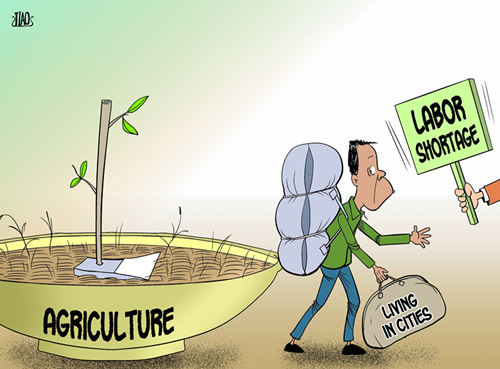"Double identity" plan raises question of disparity
- By Wu Jiachun
 0 Comment(s)
0 Comment(s) Print
Print E-mail
China.org.cn, November 10, 2011
E-mail
China.org.cn, November 10, 2011
 |
|
Left untilled [By Jiao Haiyang/China.org.cn] |
The "freedom of movement and labor" are fundamental components of any democratic system as well being crucial to social progress. There was a time when urban residency status was the dream of many rural dwellers. With the development of reform and opening up, the dream of becoming a city resident has become more achievable. Farmers flock to cities in large numbers. In 2010, the number of migrant workers in Yunnan reached 7.7 million. Although it hasn't outnumbered its neighboring provinces, it's unusual to see the decline of the percentage of urban dwellers.
In fact, it takes more than changing one's residency status to become an urban citizen. The corresponding social insurance is far more important and complex. Many migrant workers are not willing to give up their land. They believe that if all else fails, they can still go back and make a living from the land. As a result, many migrant workers choose to work in the city and leave their residency status unchanged. However, migrant workers' reluctance to give up their rural residence status will hinder their ability to fully integrate into city life.
Recently, Yunnan announced a series of proposals which aim to accelerate the process of attracting migrant workers to cities and thereby balance urban and rural development. The measures, titled, "Suggestions by the People's government of Yunnan Province", propose that anyone leaving the country to live in the city should "enjoy double identities, five reservations and five guarantees."
Under the new proposals, migrant workers working in the city could hold both urban and city residency status for a given period of time. They could enjoy equal treatment with regard to employment, social security, housing, education and healthcare. In the meantime, they would be able to retain their contracted rural land, house sites, woodland, preferential policies in family planning and collective farm bonuses for a certain period of time. This policy has been aptly described as "tuck the migrant workers in two blankets." The policy allows migrant workers to move to cities, where resources and capital are more abundant. They can therefore live much more comfortable, dignified lives in cities, and feel more confident to do so.
However, China is a populous country and has limited resources. If migrant workers have housing in both cities and on their contracted rural land, an imbalance of resources will be created.
In this regard, we should consider the following two, far deeper problems: First, there is the problem of adjusting the industrial layout. This could be solved by companies relocating from big cities to small and medium-sized towns. Second, there is the question of rural development. Both agricultural intensification and industrialization may serve to address urban and rural disparities.
(This article was written in Chinese and translated by Li Huiru.)
Opinion articles reflect the views of their authors, not necessarily those of China.org.cn





